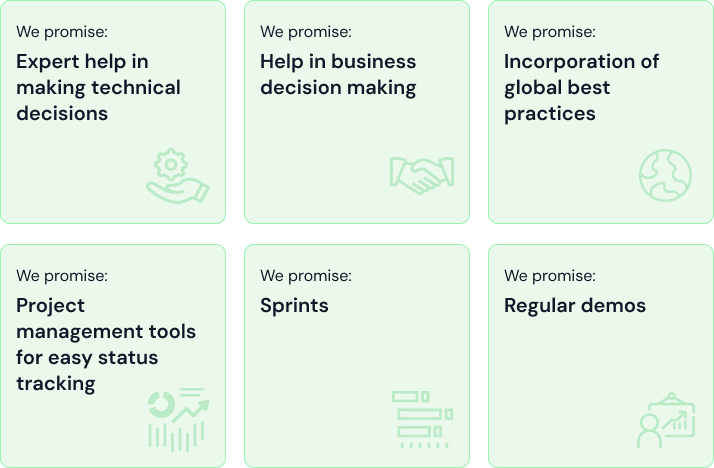Introduction
While all parties go into a software development process with high hopes for victory, developing and launching a successful software platform is much easier envisioned than accomplished. There are a lot of things that could go wrong, with potential reasons for failure including issues with communication stemming from language and culture barriers, a vendor’s lack of understanding of the business and technical requirements, or a business’s inability to articulate a clear vision for the project.
Unfortunately, there is no way to guarantee a successful project, but there are several things both client and vendor can do to set themselves on the right path. After all, a development project’s success is usually built on a variety of components that lead to a fruitful partnership between the vendor team and the client. In this blog post, we’ll explore those components, and then we’ll outline how to determine whether a partnership with a particular vendor is likely to be successful.
The Mindset: “Not Failure” versus “Success”
Let’s start with two distinct approaches, or goals, that a vendor might bring into the relationship: “Not Failure” or “Success.”
The "Not Failure” approach is about doing the bare minimum of work, not to succeed but simply to avoid failure. “Success,” on the other hand, takes the whole project a step further, going the extra mile to create an end result that not only achieves the bare minimum but goes above and beyond to satisfy or exceed the clients’ expectations.
As you talk with a vendor, you can see which mindset they bring to the table. Are they talking about cutting corners? Keeping the work fast and cheap? Or are they really working with you to understand what you need and think through the best way to accomplish it? By understanding a potential vendor’s approach mindset around the software development process—whether they want to avoid failure or achieve success—we can start to see whether the vendor relationship is likely to be successful.
Project Management Tools
Almost every vendor nowadays uses project management and planning tools. These could be commercial tools such as Jira, Redmine, Asana, or Trello, etc., or they could be internally created project roadmaps. These tools are used to reduce delays and risks, and it is impossible to imagine staying organized and completing a project without them. But the simple fact that a vendor uses a project management tool doesn’t mean they are a shoo-in for success. What matters is how they use their tools.
For example, delays are fairly common as a project progresses, usually caused by unforeseen obstacles. Simply noting those delays on the dashboard of a project management tool is not enough—though it’s all many vendors do. Rather, when the vendor uses those tools to uncover the causes of delays, overcome obstacles, adjust roadmaps, and ensure the developers and client are still on the same page, that indicates a success mindset.
How can you tell whether a team will implement their project management tools effectively to set a project up for success? Look at their history of implementation on previous projects, and to ask them to show you how they use these tools today. For example, are both parties getting the information they need from the project management strategy? While the development team needs access to a full list of specific tasks and deadlines, what the client requires is a visual depiction of targets as a whole. A quality vendor knows how to set up roadmaps in such a way that any stakeholder could understand the high-level overview, current status, and short-term targets of the project within a few minutes, while the development team have the minutiae at their fingertips.
Technical Expertise
Every company offering software development services advertises the quality of their engineers. So how can a potential client be sure they’re getting a team who will be a true partner, providing valuable solutions every step of the way?
Well, it’s important to start by understanding that technical expertise alone is not enough for true success. Nearly every vendor on the market has technical expertise, but savvy customers are looking for more. Developers who take a success-centric approach will offer not only their technical skills but also their decision-making expertise in terms of developing the strategies required to achieve the desired business results. For example, the developer needs to have a deep understanding of the client’s business needs and be able to communicate recommendations for different technologies, programming languages, and approaches to development. This type of critical thinking—and ability to educate the client—are as important as technical expertise. Implementation is important of course, but to be truly successful, a vendor must also be a strategic partner for its clients.
Sprints
Every client’s project is special and complicated, requiring business analysis, a great deal of decision making, and plenty of work. It can be hard for clients to be confident in how the work is progressing, and this is especially true when (as is often the case) a development team isn’t composed of full-time employees with the same loyalty to the company and basic proximity to its leadership.
So, what do success-minded vendors offer to ease these concerns? Sprints.
The method of breaking down the development process into two-week sprints—with clear goals, regular communication, and formal updates before and after each—is common practice. It helps the team stay on track, lets clients see the progress being made, and ensures both parties are on the same page every step of the way. If a team is not prepared to work in sprints, that’s a clear red flag for a potential customer.
Many vendors with true success mindsets have introduced weekly sprints, as well as biweekly. These shorter sprints are particularly useful during complex parts of the project, such as integrating the client and vendor teams, though they may be used for the duration of the engagement. Weekly sprints are harder to implement, as they mean additional strain for the teams, but they do provide better visibility into progress toward goals and allow teams to start working through any challenges that may appear before they become thorny obstacles.
Demos
Regularly scheduled demos are another tool that can be used for accountability, visibility, and effectiveness throughout the life of a project. These are used to visualize what the developers have accomplished during each sprint so that the client has full transparency into the progress.
Demos can be adapted to address both business and technical stakeholders, whose questions and perspectives will likely be very different. This way all parties get the chance to be heard and have their questions answered. The result of a successful demo system is that everyone knows how the project is progressing and is still in agreement on goals and next steps.
Will Your Vendor Collaboration Be Successful?
Now that you know how to determine whether a vendor focused on achieving actual success or simply “not failing,” we can offer some practical advice on selecting the right partner, all based on common issues clients have told us they’ve experienced while integrating with other vendor teams. We’ll share the promises you want to hear from a potential vendor, as well as how to be confident the vendor will keep those promises.

The Promise: Expert help in making technical decisions.
Even in the initial discussions, before contracts have been signed, don’t be afraid to ask some strategy questions. A quality vendor will be willing and able to make recommendations on the use of particular programming languages and frameworks. They can make a clear case for a specific choice based their experience and perspectives. Additionally, be sure the vendor’s technical director will be overseeing the project and taking part in technical decision making when necessary.
The Promise: Help in business decision making.
Listen to the questions the vendor asks during initial conversations. They should want to know how the proposed project fits into the overall picture of your business, and their team should include process engineers who can help optimize business processes within your organization.
The Promise: Incorporation of global best practices.
Ask the vendor to show examples of best practices they have implemented on previous projects.
The Promise: Project management tools for easy status tracking.
Ask the vendor to explain what tools will be used and to show examples of the use of such tools on previous projects.
The Promise: Sprints.
Ask how the sprints are structured and whether each sprint will show specific results.
The Promise: Regular demos.
Ask the vendor to show some previous demos that were held with both business and technical stakeholders in mind.
As we said, there is no guarantee of success in any software development project, but that doesn’t mean clients have to simply hope for the best when choosing their vendors. As you interview potential partners, keep your eyes open for indicators of the “Not Failure” mindset versus the true success mindset. Ask questions, listen carefully, and select the vendors who will work hard to integrate with your team and create the solution you need to achieve your business goals.



